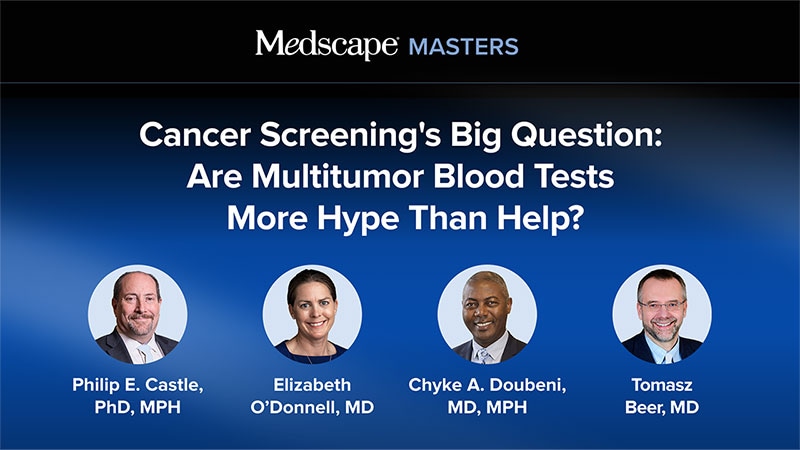Are Multitumor Blood Tests: Hype or Help?
แนวคิดหลัก
Multitumor blood tests show promise but face challenges in early cancer detection and health equity.
บทคัดย่อ
The recent Medscape Masters roundtable delved into the effectiveness and challenges of multitumor blood tests for early cancer detection. The discussion, moderated by experts in the field, highlighted the potential of these tests in detecting lethal cancers like ovarian and pancreatic cancer. However, uncertainties remain regarding their sensitivity, specificity, and overall performance. The goal is to detect rare and lethal cancers early to avoid complex treatments. False-positive rates are a concern, with current tests showing higher specificity compared to single-cancer screening tests. The availability of these tests aims to make early cancer detection more accessible but may not address all healthcare disparities. Cost, trust in the healthcare system, and limited access remain significant barriers.
Translate Source
To Another Language
Generate MindMap
from source content
Visit Source
www.medscape.com
Are Multitumor Blood Tests More Hype Than Help?
สถิติ
"Here, we're looking at 1% or so." - Beer
"About 1% who undergo the testing will have a positive result, and of those who have a positive result, about 2 out of 5 end up with a cancer diagnosis." - Beer
คำพูด
"When you think about the false-positive rates for current, accepted single-cancer screening tests, they tend to be around 10%-11%." - Beer
"I don't think that we should hang our hopes on the fact that if MCED tests were available today, it would solve the equity problem." - Doubeni
สอบถามเพิ่มเติม
How can the healthcare system address the challenges of false-positive results in multitumor blood tests?
False-positive results in multitumor blood tests can pose significant challenges, including unnecessary anxiety for patients and additional healthcare costs. To address this issue, healthcare systems can implement several strategies. Firstly, education and communication are key. Providing clear and accurate information to patients about the possibility of false positives, the reasons behind them, and the follow-up steps can help manage expectations and reduce anxiety. Additionally, healthcare providers should be trained to interpret and communicate test results effectively, ensuring that patients understand the implications of a positive result.
Secondly, refining the algorithms and criteria used in these tests can help reduce false positives. Continuous research and development to improve the specificity of the tests can minimize the occurrence of false alarms. Moreover, establishing clear guidelines for follow-up testing and interventions in case of a positive result can streamline the process and prevent unnecessary procedures.
How can the healthcare system ensure that these tests are accessible to underserved populations?
Ensuring that multitumor blood tests are accessible to underserved populations is crucial for addressing healthcare disparities in cancer detection. To achieve this goal, healthcare systems can take several steps. Firstly, increasing awareness and education about the availability and benefits of these tests among underserved communities is essential. Outreach programs, community partnerships, and targeted marketing campaigns can help raise awareness and encourage individuals to seek testing.
Secondly, addressing financial barriers is crucial. Healthcare systems can explore options for subsidizing or covering the costs of these tests for underserved populations, such as through government funding, insurance coverage, or sliding scale fees based on income. Additionally, expanding access to testing facilities in underserved areas, including mobile clinics or community health centers, can improve convenience and reduce logistical barriers to testing.
How can the healthcare system build trust and reduce barriers to early cancer detection through these tests?
Building trust and reducing barriers to early cancer detection through multitumor blood tests requires a multifaceted approach. Firstly, transparent communication about the benefits, limitations, and potential outcomes of these tests is essential to establish trust with patients. Healthcare providers should engage in open and honest discussions with patients, addressing their concerns and ensuring that they feel informed and empowered throughout the testing process.
Secondly, addressing cultural and linguistic barriers is crucial for improving access and trust among diverse populations. Healthcare systems should prioritize cultural competency training for providers, offer language interpretation services, and tailor educational materials to the specific needs of different communities. Building partnerships with community organizations and leaders can also help foster trust and increase acceptance of these tests among underserved populations.
Furthermore, addressing structural barriers such as cost, transportation, and access to follow-up care is essential for ensuring that early cancer detection through multitumor blood tests is equitable and effective. By implementing policies that prioritize affordability, convenience, and continuity of care, healthcare systems can reduce barriers and improve outcomes for all patients.

